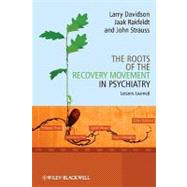
Jaak Rakfeldt is Professor of Social Work at the Southern Connecticut State University in New Haven, CT, USA.
John Strauss is Emeritus Professor of Psychiatry the Department of Psychiatry at Yale University in New Haven, CT, USA.
Acknowledgements
1 Introduction
1.1 What is the recovery movement in psychiatry?
1.2 Rationale for the book
1.3 From traitement moral to moral treatment
1.4 Reciprocity in community-based care
1.5 The everyday and interpersonal context of recovery
1.6 Closing the hospital
1.7 The rights and responsibilities of citizenship
1.8 Agency as a basis for transformation
1.9 Why these figures and not others?
1.10 Conclusion
2 FromTraitement Moral to Moral Treatment
2.1 The birth of psychiatry as a medical speciality
2.2 Philippe Pinel and Jean-Baptise Pussin
2.3 Traitement moral
2.4 Pinel’s psychological interventions
2.5 The Retreat at York
2.6 Moral treatment or moral management?
2.7 From treatment to education
2.8 Re-shaping character
2.9 The demise of moral treatment
2.10 Summary of lessons learned
3 Reciprocity in Community-based Care
3.1 The advocacy of dorothea dix
3.2 The legacy of dorothea dix
3.3 Jane Addams’ community alternative
3.4 A series of unfortunate, but influential, events
3.5 The founding of the first american ‘settlement’
3.6 Forty years at hull-house
3.7 Distilling the active ingredients
3.8 Interventions with individuals
3.9 Interventions with collectives
3.10 Applications to mental health
3.11 Summary of lessons learned
4 The Everyday and Interpersonal Context of Recovery
4.1 The birth of psychiatry as a community-based practice
4.2 Beyond the illness paradigm (by John Strauss, part 1)
4.3 Growing up inside meyer’s ‘common sense’ psychiatry (by John Strauss, part 2)
4.4 Subjectivity and the person (by John Strauss, part 3)
4.5 Blending science and art in a human science (by John Strauss, part 4)
4.6 From a psychiatry based in death to a psychiatry based in life
4.7 Problems in everyday living and their resolution
4.8 Opportunity and occupation
4.9 The interpersonal context of recovery
4.10 Summary of lessons learned
5 Closing the Hospital
5.1 The failure of the asylum
5.2 Erving Goffman and the presentation of self
5.3 The hospital as ‘total institution’
5.4 Franco Basaglia and the Italian mental health reform movement
5.5 De-institutionalization the Italian way
5.6 Bracketing the illness
5.7 ‘Freedom is therapeutic’
5.8 Avoiding the re-creation of the asylum in the community
5.9 Social inclusion
5.10 Summary of lessons learned
6 The Rights and Responsibilities of Citizenship
6.1 Recovery as a civil rights movement
6.2 The incomplete world of Martin Luther King, Jnr
6.3 Can rights be given?
6.4 Recovery delayed is recovery denied
6.5 Colour blindness and capitalism
6.6 The complete subject of Gilles Deleuze
6.7 Oedipus and anti-oedipus
6.8 Schizophrenic speech and Watergate
6.9 Community inclusion vs community integration
6.10 Summary of lessons learned
7 Agency as the Basis for Transformation
7.1 The need for a new conceptual framework
7.2 Beyond de-institutionalization and community tenure
7.3 Rights and recovery
7.4 The capabilities approach of Amartya Sen
7.5 Applying a capabilities approach to the work of transformation
7.6 Human agency and mediation: the work of Lev Vygotsky
7.7 Action theory, the zone of proximal development and scaffolding
7.8 Applying activity analysis: the case of fossilized behaviour
7.9 Applying activity analysis: using the zone of proximal development
7.10 Summary of lessons learned
8 Conclusion
References
Index
The New copy of this book will include any supplemental materials advertised. Please check the title of the book to determine if it should include any access cards, study guides, lab manuals, CDs, etc.
The Used, Rental and eBook copies of this book are not guaranteed to include any supplemental materials. Typically, only the book itself is included. This is true even if the title states it includes any access cards, study guides, lab manuals, CDs, etc.